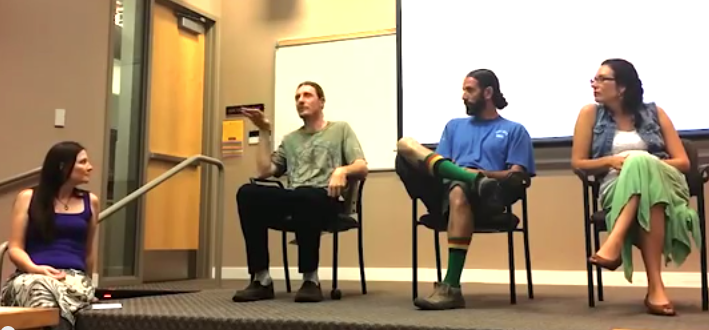
Food Chains: Human Rights and the Fair Food Program
April 14, 2015
Last month OCFAC joined with Chapman University’s Food Science and Nutrition Student Association to host a thought-provoking film and panel presentation attended by over 50 individuals. The film Food Chains was centerpiece, a 2014 documentary profiling the successful effort of Florida farm workers to gain basic wages and safer working conditions from some of the world’s largest supermarket and food corporations.
Panel presentations from Melody Gonzalez (Coalition of Immokalee Workers), Joe Linnert (Garden Coordinator, Warwick Community Garden), and Scott Keltic Knott (Hip hop artist and urban farmer) helped audience members gain insight into the farmworker experience and draw California linkages.
Food Chains profiles Florida’s Coalition of Immokalee Workers (CIW). Members of CIW detail their deplorable working conditions, including enslavement, while harvesting a majority of the nation’s tomato crop. Together members of CIW launched the Fair Food Program, an ultimately successful campaign to reach out for support among the nation’s largest grocers. The campaign asked supermarkets and fast food chains to simply pay a penny more for each pound of tomatoes purchased, and to purchase tomatoes only from those farms adhering to the basic human rights principles laid out by the Fair Food Program.
Twelve major retailers, from Walmart to Burger King, signed onto the campaign, now labeled “the best workplace monitoring program” in the U.S. by the New York Times. Those retailers refusing to sign onto the campaign, including Kroger, Safeway and Wendy’s, face an increasing public backlash.
Charles Quinto, President of the Chapman Food Science and Nutrition Student Association (FSNSA), shared how the film struck a chord with fellow students and shocked all to hear that “in some cases, workers were chained and forced into labor as recent as 2008.”
“Through hearing about the Fair Food program, I’m a lot more conscious when I go to the grocery store” Quinto said. “It’s hard to see the purchasing decisions made by the grocers, and as an average consumer, we don’t always get to select where our food comes from. It would be great if the retailers signing on to the Fair Food principles would make their intentional decisions more known to the consumer to promote awareness.”
As Charles gets ready to earn his Masters in Food Science and leave academia this spring, he is looking forward to seeking out productive partnerships between groups like OCFAC and future employers. “This was my first event with OCFAC.” Quinto continued, “it would be great to work toward future partnerships that consider not just food safety – my intended career field – but also all the social issues around food. Food incorporates so many concerns, and we are all living in the same community. Food is the thing that can connect us. We all need food to survive, we need to help each other out.”
Written by Christina Hall, Adjunct Faculty of Food Science

